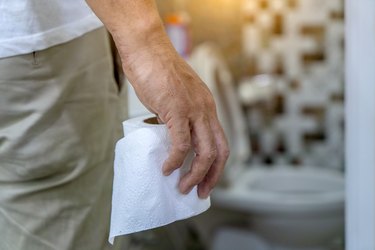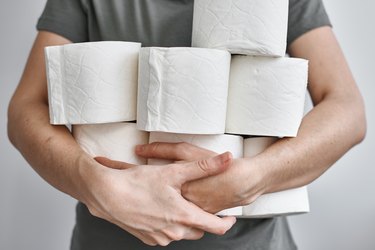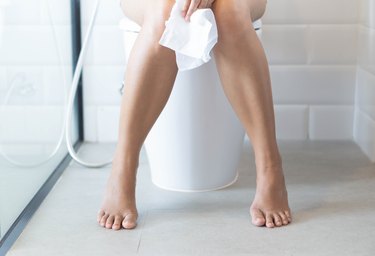
Oh my gosh, it's your worst nightmare: You poop and, quite honestly, you feel so much better. Like a lighter, better version of yourself. Only then you turn around and look in the loo. The log is so large you're worried it's not going to flush down. (Seriously, will it?)
"[Taking a big poop] can be really embarrassing for people, especially if it happens when they're out at a restaurant or someone else's house," says Jacqueline Wolf, MD, a gastroenterologist at Beth Israel Deaconess Medical Center in Boston and author of A Woman's Guide to a Healthy Stomach.
Video of the Day
Video of the Day
A toilet-clogging bowel movement can happen for a few reasons, Dr. Wolf says. It may be your diet, the fact you haven't gone in awhile or that you're not getting everything out completely when you do go. It could also be an anatomy issue. Let's chat about each of these.
1. Your Diet (and It Might Be Super Healthy)
You've probably been told at one point or another to eat more fiber. Indeed, when it comes to fiber recommendations, the Dietary Guidelines for Americans advise getting between 25 and 34 grams a day if you're under 50, or 22 to 28 grams if you're over that age.
Because fiber is considered one of the shortfall nutrients — meaning most of us aren't getting enough — it's probably safe to say you should be eating more than you are now. And if you're making an effort to really pack in more fiber-rich foods (broccoli, leafy greens, beans, whole grains), well, that's a boon for your overall and GI health, but the change may have some unexpected side effects.
"Fiber helps bulk up the stool, while water also gets drawn into your stool. And so, sometimes, if you've consumed a lot of fiber and fluid, you'll make a big stool," Dr. Wolf says.
That's certainly not a call to eat less fiber or get dehydrated — indeed, both help promote regularity and healthy stool. But if you've really been hitting the fiber, that might be the reason your poop is different.
Related Reading
2. You Haven't Gone in Awhile
You don't have to go every day to have a healthy GI system. The National Institute of Diabetes and Digestive and Kidney Diseases says that constipation is having fewer than three bowel movements per week, stools that are hard and dry or stool that's difficult to pass.
Basically, everyone is going to have their own unique rhythm that dictates what's normal for them. But if it's been awhile for you, then constipation may be the reason your poop is too big to come out and hurts.
Common causes of constipation include:
- Not eating enough fiber
- Eating too many high-sodium foods
- Not getting enough fluids
- Lack of exercise
- Stress
- A nutrient imbalance, such as vitamin B12 deficiency
- Frequently holding in your poop
- Being pregnant
- Certain medical conditions, including IBS and pelvic floor dysfunction
- Some medications, such as opioids, iron supplements and certain antidepressants
To avoid this problem in the future, you'll want to make sure you eat the recommended amount of fiber for you, Dr. Wolf says. And focus on physical activity.
"Exercise will increase stool output because it moves things along. It does this by changing the hormones in your gut and also impacting the way muscles [in your GI system] are moving," she says.
What also helps is having a bowel movement when you get the urge to go.
"When you hold it in and you lose the urge, stool just sits there," Dr. Wolf says.
Giving yourself time to poop in the morning or consuming coffee can encourage things to get going when you're in an opportune and comfortable place (your home) versus when you're out.
How Do You Pass an Already-Hard Stool?
Preventing constipation in the first place is ideal, but how do you soften an already-hard stool so you can get it out? If lifestyle changes like eating a fiber-rich diet, drinking plenty of water and getting more exercise don't do the trick, you might try a laxative to help you pass a big poop, per Johns Hopkins Medicine.
If hard stool is the issue, you'll want to look for an osmotic laxative, which draws water from the rest of your body into your bowel to help soften your poop, per the NHS. One of the most popular osmotic laxatives is MiraLAX ($27.74, Amazon).
Tip
Laxatives should only be used occasionally, per the NHS. If your constipation does not improve after a week, talk to your doctor about other treatment options.
3. You’re Not Getting All of Your Stool Out When You Go
So, here's a little (entirely beginner) anatomy lesson: Once stool travels through your digestive tract and gets to your rectum and fills up, it sends a signal that the contents must go. Your pelvic floor then relaxes rectal muscles and the anal sphincter opens.
"In some people, this process doesn't work very well," Dr. Wolf says. Straining to go actually works against you because you're holding onto stool while pushing really hard. In this case, if your poop is stuck and won't come out, it could be a sign of pelvic floor dysfunction.
Dr. Wolf recommends elevating your feet, which will straighten out the angle toward the anus so you can poop more completely. This is where bathroom stools like the Squatty Potty come in.
That said, raising your feet might not be the answer for everyone. You may need to see a pelvic floor physical therapist, who can teach you how to use everyday tools like breathing exercises to relax and have a full poop.
4. You Have a Larger-Than-Normal Colon
Megacolon is the term for an overly wide colon (aka large intestine), which can lead to big poops because it essentially allows more than the usual amount of stool to pile up in your colon, according to Osmosis. The condition can be genetic or caused by certain infections, such as Salmonella or parasitic infections, or diseases such as diabetic neuropathy, hypothyroidism and some muscular dystrophies.
It can also sometimes be caused by severe constipation, according to the University of Virginia School of Medicine, but this is less common.
Megacolon, in turn, can often lead to constipation, per Osmosis. Other symptoms might include bloating, pain and tenderness in the abdomen and, more rarely, fever and high heart rate. The condition can sometimes be dangerous, so it's important to see a doctor if you suspect you have megacolon.
When to See a Doctor About Big Poops
Big poops, even if they often clog the toilet, aren't necessarily a problem on their own. But if the cause behind them is chronic constipation, pelvic floor dysfunction or megacolon, you should see your doctor for diagnosis and treatment to avoid complications down the line.
You should also seek medical help if your poop is so large that it leads to a fecal impaction (a large lump of hard, dry stool that gets stuck in the rectum), according to the National Library of Medicine (NLM). A fecal impaction makes it hard to have a bowel movement (you could strain so hard you feel lightheaded or get a case of poop sweats) and may also lead to abdominal cramps, bloating, rectal bleeding, loss of bladder control and lower back pain, per the NLM.
You might be at risk for a fecal impaction if you:
- Have chronic constipation and use laxatives
- Don't move around much
- Have a disease of the nervous system or brain
- Take certain medications, such as anticholinergics (used to treat asthma, urinary incontinence and other conditions) or narcotic pain meds
Your doctor can treat a fecal impaction using an enema along with manual removal, per the NLM, and you'll most likely need to go through a bowel retraining program to make sure it doesn't happen again.
On a related note, you should also make an appointment with your doc about bad-smelling poop (like truly awful-smelling, not just the regular nose-scrunching smell), because this could be a sign of infection.
- National Institute of Diabetes and Digestive and Kidney Diseases: "Definition & Facts for Constipation"
- Dietary Guidelines for Americans: "Current Dietary Guidelines"
- Johns Hopkins Medicine: "Constipation"
- NHS: "Laxatives"
- Osmosis: "Megacolon: What Is It, Causes, Symptoms, Treatment, and More"
- National Library of Medicine: "Fecal Impaction"
- University of Virginia School of Medicine: "Causes of Chronic Constipation"
Is this an emergency? If you are experiencing serious medical symptoms, please see the National Library of Medicine’s list of signs you need emergency medical attention or call 911.


